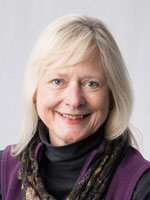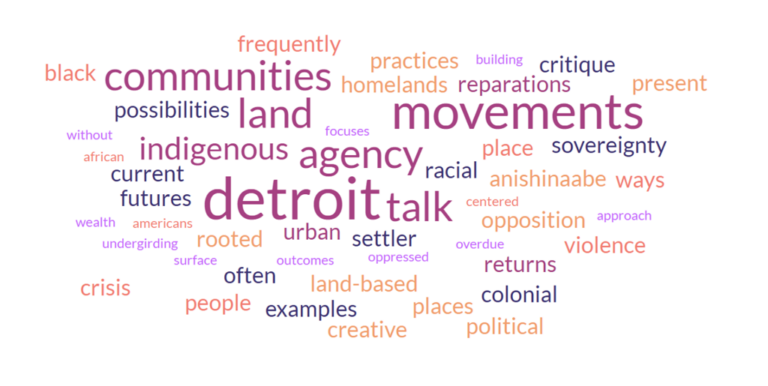New Year, New Name, New Proposal
 I am writing this column on the first day of the new year. Effective January 1, 2016, the AAG will begin to operate under the name “American Association of Geographers,” rather than “Association of American Geographers.” The membership voted overwhelmingly in both 2014 and 2015 to make this change. The name “American Association of Geographers” is a registered “DBA” or “doing business as” name. Using a DBA name does not require the AAG to change the association’s prior name, and both names can legally be used by the association. The new name will be phased in over the next year.
I am writing this column on the first day of the new year. Effective January 1, 2016, the AAG will begin to operate under the name “American Association of Geographers,” rather than “Association of American Geographers.” The membership voted overwhelmingly in both 2014 and 2015 to make this change. The name “American Association of Geographers” is a registered “DBA” or “doing business as” name. Using a DBA name does not require the AAG to change the association’s prior name, and both names can legally be used by the association. The new name will be phased in over the next year.
 I know some members are not happy about the change but it is, in fact, a recognition that our organization has changed. We have substantial membership from outside the United States. Our annual meeting is enlivened with participants from around the world. Our journals invite submissions from geographers everywhere and we publish the abstracts in multiple languages. We are an international organization that is located in the United States. The name reflects who we have become. Of course this means a new logo and some adjustments over time. And it means that at some point we may wish to re-think our systems of representation to acknowledge our growing internationalism. We have regional councillors, national councillors—do we need international councillors? That is an agenda item for another president, not me.
I know some members are not happy about the change but it is, in fact, a recognition that our organization has changed. We have substantial membership from outside the United States. Our annual meeting is enlivened with participants from around the world. Our journals invite submissions from geographers everywhere and we publish the abstracts in multiple languages. We are an international organization that is located in the United States. The name reflects who we have become. Of course this means a new logo and some adjustments over time. And it means that at some point we may wish to re-think our systems of representation to acknowledge our growing internationalism. We have regional councillors, national councillors—do we need international councillors? That is an agenda item for another president, not me.
There is always a great deal of chatter among geography departments about our names. The Department Heads listserv had a lively conversation some months ago about re-branding departments through name changes, adding words that resonate today with students such as “environment” and “sustainability.” Sometimes name changes reflect significant revision of degree plans, program foci, and a renewed sense of departmental mission. But too often these are simply superficial attempts to attract new enrollees, via relabeling versus offering an improved program or experience. To return to my presidential theme of healthy departments, any change that takes place in a department should be organic and positive, not reactive, something that inspires cohesion, offers faculty and staff an opportunity to reflect and to develop a shared sense of mission.
A young colleague recently sent me a copy of a column written by John C. Hudson in the Journal of Geography in 1984 (83 (3) 100-101) entitled Geography’s Image Crisis. John’s first line is, “Has there been a time when geography was not in crisis?” He goes on to recount some of the “dire predictions” about academic geography to make the point that geography will persist because of peoples’ natural curiosity about the world, writing, “The subject and its practitioners are not one and the same, yet we nearly always confuse the two when we speak about the future of geography.” To be frank, it is our livelihoods that concern us when we fret about geography. And our concern with the image of geography? Hudson criticizes “new aggressivism” to advance the status of the discipline, and decries attempts to justify our existence based on our value to society. But in a section that I think is prescient, he writes:
Perhaps we go too far in making ourselves subservient to rewards invented to make bureaucracies function efficiently. We confuse good teaching with awards for good teaching. We confuse good research with money given for research, and then mistake publication for evidence of scholarship. We confuse accomplishment with medals our brothers and sisters vote us certifying our accomplishments. When recognition becomes the goal, then we set our priorities accordingly.
Keeping in mind Hudson’s sage observations, we are increasingly measured; awards, grants, and publications count in ways that they did not in the past, collected and sorted through rating services like Academic Analytics. We faculty are benchmarked, discipline by discipline, to compare universities and colleges based on a range of criteria, one of which is “honorific awards bestowed upon faculty members.” This situation places pressure on faculty and departments to seek awards that are included in the Academic Analytic database. It will benefit geographers in relation to our peers if we can expand the number of honors geographers receive. Whether we like it or not—and Hudson does an excellent job pointing out the inherent fallacies in the system—we do have to be concerned about our status as individuals and departments. One can rage against the system, but we must also be clever about working within it for survival. It is self-serving, but it is the environment in which we work. And in geography a paucity of “recognized” awards are available for us to win.
AAG honors its outstanding members in a number of specific categories through an organized nomination and award process overseen by elected members of the Honors Committee. This year we are honoring about 12 individuals, a very small number given our size. Additional awards are made through the specialty groups but the number, types, and prestige of these awards is uneven. Unlike many other professional organizations, we do not have an overarching, broader-based Fellows Program. This places geographers at a disadvantage in relation to colleagues in other disciplines in achieving status at our institutions and, consequently, in national and international organizations such as the National Academies.
I have proposed the development of an AAG Fellows program similar in scope and selectivity to Fellows programs in other organizations such as AAAS and AGU. The purpose of a Fellow Program would be to recognize the significant contributions to advancing geography of a larger group of geographers. The definition of contribution would be very broad and could include service to the AAG; outstanding teaching and mentoring that impacts the profession; innovative administration in academe, government, and industry; novel and sustained research; and outreach that communicates the importance and value of geography to the public. The definition of significant would have to be specified as well, that this exceptional honor is reserved for a limited number of members of AAG.
If we begin such a program, we would simply be following other professional associations. The American Mathematical Society initiated a new program in 2011, partly to “…make mathematicians more competitive for awards, promotion and honors when they are being compared with colleagues from other disciplines.” A proposal to Council is under development. I think it is a good idea but I would like to hear from you. I am mindful of voices like that of John Hudson (who I count as a friend), who concludes his article, “If geography faces a crisis today it is an inner crisis, an impoverishment of the spirit, and one that has come from listening to those who advocate aggrandizement rather than accomplishment.” An AAG Fellows program would have to be about honoring accomplishment.

